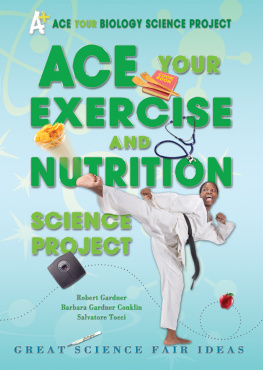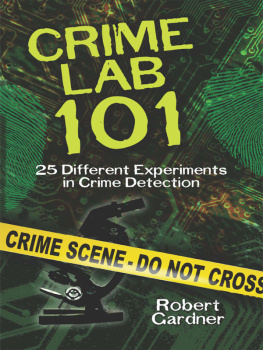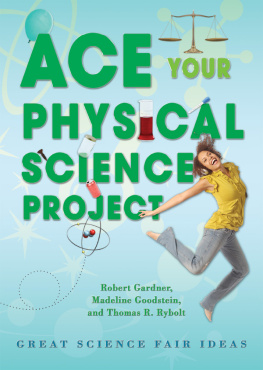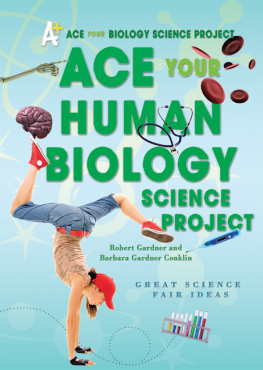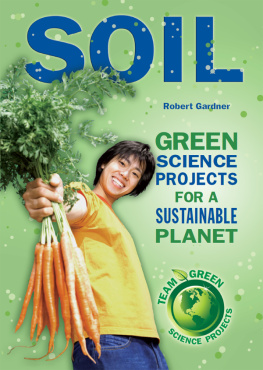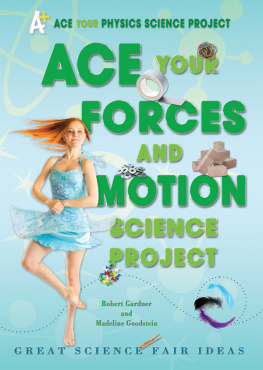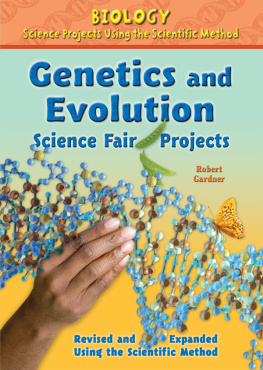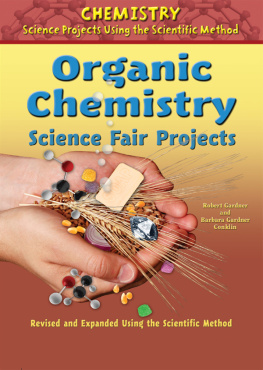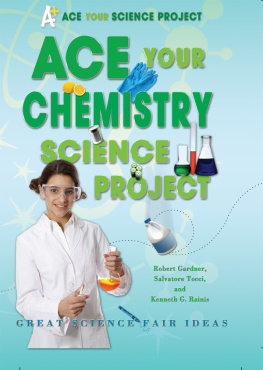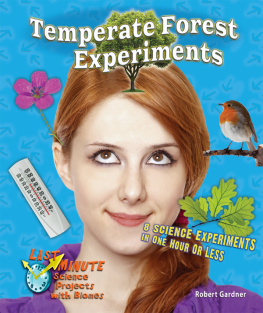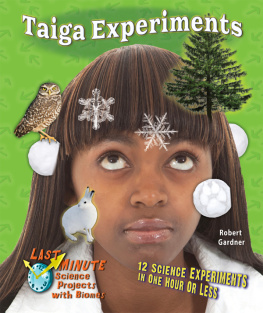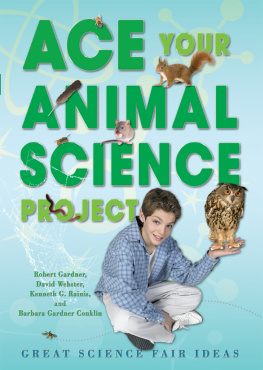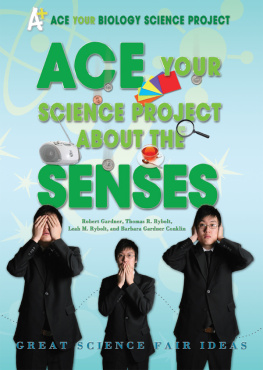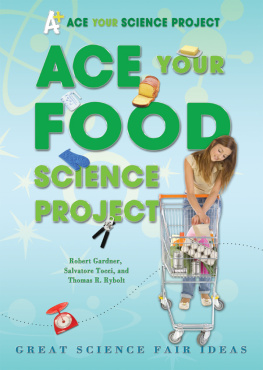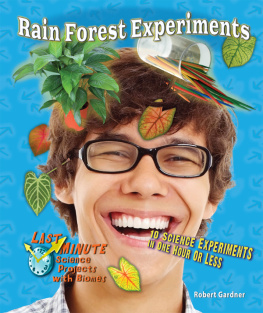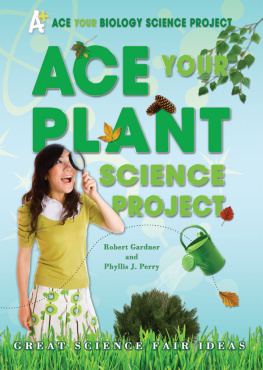Robert Gardner - Ace Your Exercise and Nutrition Science Project
Here you can read online Robert Gardner - Ace Your Exercise and Nutrition Science Project full text of the book (entire story) in english for free. Download pdf and epub, get meaning, cover and reviews about this ebook. year: 2010, publisher: Enslow Publishers, genre: Children. Description of the work, (preface) as well as reviews are available. Best literature library LitArk.com created for fans of good reading and offers a wide selection of genres:
Romance novel
Science fiction
Adventure
Detective
Science
History
Home and family
Prose
Art
Politics
Computer
Non-fiction
Religion
Business
Children
Humor
Choose a favorite category and find really read worthwhile books. Enjoy immersion in the world of imagination, feel the emotions of the characters or learn something new for yourself, make an fascinating discovery.
- Book:Ace Your Exercise and Nutrition Science Project
- Author:
- Publisher:Enslow Publishers
- Genre:
- Year:2010
- Rating:3 / 5
- Favourites:Add to favourites
- Your mark:
- 60
- 1
- 2
- 3
- 4
- 5
Ace Your Exercise and Nutrition Science Project: summary, description and annotation
We offer to read an annotation, description, summary or preface (depends on what the author of the book "Ace Your Exercise and Nutrition Science Project" wrote himself). If you haven't found the necessary information about the book — write in the comments, we will try to find it.
How does antibacterial soap affect bacteria? What diet meets your energy requirements? How can you measure blood pressure, metabolic rate, and calories? Young scientists learn about the scientific method while experimenting with hygiene and health. Many experiments in this book include ideas you can use for science fair projects.
Ace Your Exercise and Nutrition Science Project — read online for free the complete book (whole text) full work
Below is the text of the book, divided by pages. System saving the place of the last page read, allows you to conveniently read the book "Ace Your Exercise and Nutrition Science Project" online for free, without having to search again every time where you left off. Put a bookmark, and you can go to the page where you finished reading at any time.
Font size:
Interval:
Bookmark:
THE SCIENCE OF STAYING HEALTHY
What diet meets your energy requirements? How can you measure blood pressure, metabolic rate, and calories? Learn about the scientific method while you are experimenting with life science. Many experi ments in this book include ideas you can use for your science fair project.
About the Authors
ROBERT GARDNER is a retired high school teacher of physics, chemistry, and physical science. BARBARA GARDNER CONKLIN is a special education teacher. After teaching science for nearly thirty years, SALVATORE TOCCI decided to devote his time to writing chemistry textbooks and science books for young readers.

When you hear the word science, do you think of a person in a white lab coat surrounded by beakers of bubbling liquids, specialized lab equipment, and computers? What exactly is science? Maybe you think science is only a subject you learn in school. Science is much more than that.
Science is the study of the things that are all around you, every day. No matter where you are or what you are doing, scientific principles are at work. You dont need special materials or equipmentor even a white lab coatto be a scientist. Materials commonly found in your home, at school, or at a local store will allow you to become a scientist and pursue an area of interest. By making careful observations and asking questions about how things work, you can begin to design experiments to investigate a variety of questions. You can do science. You probably already have but just didnt know it!
Perhaps you are reading this book because you are looking for an idea for a science fair project for school, or maybe you are just hoping to find something fun to do on a rainy day. This book will provide an opportunity for you to learn about exercise and nutrition and how they affect your health. You will measure your heart rate, breathing rate, blood pressure, and temperature and investigate how they are affected by body position, exercise, and conditioning. You will then have an opportunity to evaluate your metabolic needs, design a diet to meet them, and explore healthy eating habits. Finally, you may choose to conduct experiments involving products that promote good health and hygiene.
Many of the experiments in this book may be appropriate for science fair projects. Experiments marked with a symbol ( ) include a section called Science Fair Project Ideas. The ideas in this section provide suggestions to help you develop your own original science fair project. However, judges at such fairs do not reward projects or experiments that are simply copied from a book. For example, a picture of a food pyramid, which is commonly found at these fairs, would probably not impress judges unless it was done in a novel or creative way. On the other hand, a carefully performed experiment to determine the amount of energy in different snack foods would probably receive careful consideration.
) include a section called Science Fair Project Ideas. The ideas in this section provide suggestions to help you develop your own original science fair project. However, judges at such fairs do not reward projects or experiments that are simply copied from a book. For example, a picture of a food pyramid, which is commonly found at these fairs, would probably not impress judges unless it was done in a novel or creative way. On the other hand, a carefully performed experiment to determine the amount of energy in different snack foods would probably receive careful consideration.
Science fair judges tend to reward creative thought and imagination. However, its difficult to be creative or imaginative unless you are really interested in your project. If you decide to do a project, be sure to choose a topic that appeals to you. Consider, too, your own ability and the cost of materials. Dont pursue a project that you cant afford.
If you decide to use a project found in this book for a science fair, you will need to find ways to modify or extend it. That should not be difficult because you will probably find that as you do these projects new ideas for experiments will come to mind. These new experiments could make excellent science fair projects, particularly because they spring from your own mind and are interesting to you.
If you decide to enter a science fair and have never done so before, you should read some of the books listed in the Further Reading section. The books that deal specifically with science fairs will provide plenty of helpful hints and lots of useful information that will enable you to avoid the pitfalls that sometimes plague first-time entrants. You will learn how to prepare appealing reports that include charts and graphs, how to set up and display your work, how to present your project, and how to relate to judges and visitors.
As with many activities, safety is important in science, and certain rules apply when conducting experiments. Some of the rules below may seem obvious to you, but each is important to follow.
- Have an adult help you whenever the book advises.
- Wear eye protection and closed-toe shoes (rather than sandals) and tie back long hair.
- Dont eat or drink while doing experiments and never taste substances being used.
- Avoid touching chemicals.
- When doing these experiments, use only nonmercury thermometers, such as those filled with alcohol. The liquid in some thermometers is mercury. It is dangerous to breathe mercury vapor. If you have mercury thermometers, ask an adult to take them to a local mercury thermometer exchange location.
- Do only those experiments that are described in the book or those that have been approved by an adult.
- Never engage in horseplay or play practical jokes.
- Before beginning, read through the entire experimental procedure to make sure you understand all instructions. Clear extra items from your work space.
- At the end of every activity, clean all materials and put them away. Wash your hands thoroughly with soap and water.
All scientists look at the world and try to understand how things work. They make careful observations and conduct research about a question. Different areas of science use different approaches. Depending on the phenomenon being investigated, one method is likely to be more appropriate than another. Designing a new medication for heart disease, studying the spread of an invasive plant species such as purple loosestrife, and finding evidence about whether there was once water on Mars all require different methods.
Despite the differences, however, all scientists use a similar general approach to do experiments. It is called the scientific method. In most experiments, some or all of the following steps are used: making an observation, formulating a question, making a hypothesis (an answer to the question) and prediction (an if-then statement), designing and conducting an experiment, analyzing results and drawing conclusions, and accepting or rejecting the hypothesis. Scientists then share their findings with others by writing articles that are published in journals. Afterand only aftera hypothesis has repeatedly been supported by experiments can it be considered a theory.
You might be wondering how to get an experiment started. When you observe something in the world, you may become curious and think of a question. Your question can be answered by a well-designed investigation. Your question may also arise from an earlier experiment or from background reading. Once you have a question, you should make a hypothesis. Your hypothesis is a possible answer to the question (what you think will happen). Once you have a hypothesis, it is time to design an experiment.
In some cases, it is appropriate to do a controlled experiment. This means there are two groups treated exactly the same except for the single factor that you are testing. That factor is often called a variable. For example, if you want to investigate whether exercise affects heart rate, two groups may be used. One group is called the control group, and the other is called the experimental group. The two groups of people should be treated exactly the same. The people in the control group will sit quietly for five minutes while the people in the experimental group will jog in place for five minutes. The variable is exerciseit is the thing that changes, and it is the only difference between the two groups.
Font size:
Interval:
Bookmark:
Similar books «Ace Your Exercise and Nutrition Science Project»
Look at similar books to Ace Your Exercise and Nutrition Science Project. We have selected literature similar in name and meaning in the hope of providing readers with more options to find new, interesting, not yet read works.
Discussion, reviews of the book Ace Your Exercise and Nutrition Science Project and just readers' own opinions. Leave your comments, write what you think about the work, its meaning or the main characters. Specify what exactly you liked and what you didn't like, and why you think so.

